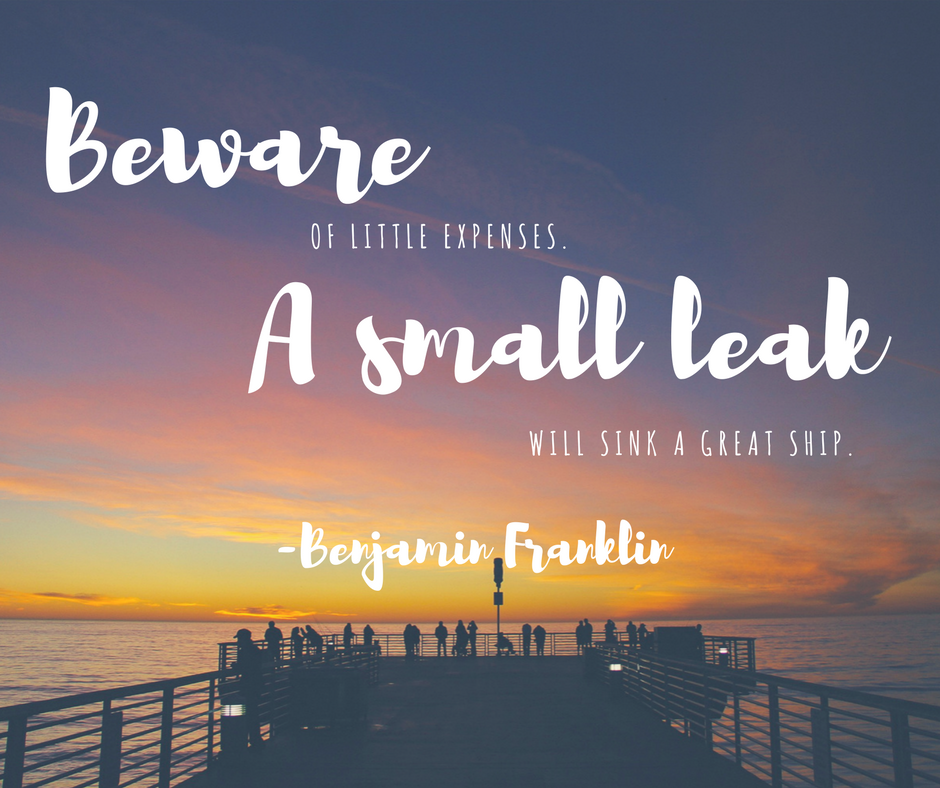How Sweating The Small Stuff Is Actually A Good Thing
Don’t sweat the small stuff. You’ve heard that phrase before, right? People say it often – we don’t need to sweat the small stuff in life because there are more important things in life. When it comes to budgeting, on the other hand, you do need to sweat the small stuff, at least at first. One of my favorite quotes, when it comes to discussing finances, is the one by Benjamin Franklin below, as it rings so true. 
When it comes to your finances, a small leak can be anything. Your daily cup of coffee, to trips to the grocery store, to meals out. If you’re a spender, the small leak can be something bigger, something you may not even notice.
Take this example below, all little expenses:
Monday, you head to the grocery store to get items for dinner. You spend $22 on your groceries and splurge on a cake from the bakery for dessert.
Tuesday, on the way to work you stop for a morning coffee, a macchiato, $4, and a bagel, $2.50. For dinner, you stop by a local fast food restaurant for $7.50 on the way home.
Wednesday rolls around, and a colleague invites you out for lunch. You happily accept and spend $13.50 on your lunch. Dinner time comes again, so you stop by the store on your way home, and plan ahead for the next 2 days, so you spend $53.50.
It is easy for small expenses to escalate as the week progresses…
Thursday comes and goes, you stopped for coffee and a donut, which is another $6.50 out the window. There was a free lunch just by chance, so the $4.50 worth of food you had bought the night before to plan ahead goes to waste. Although dinner items have already been purchased, you realize some of the refrigerated items were left out and have spoiled. A quick run to the store costs another $12.50.
Friday is finally here, but you have realized the chaos of spending from the week and decide to be extra frugal. You do not buy anything all day, but end with mediocre meals and want something better. You rationalize the week wasn’t that bad and decide to treat yourself to a small ice cream for $5.00.
Saturday and Sunday have arrived! The chores, running errands, and other activities have started. Amidst the chaos and lack of time, you skip breakfast and just buy a coffee for $3.00 one day on Saturday. Lunch is forgotten, but dinner was already planned to be at a restaurant. As the busy week is forgotten, you relax and drop another $45.00 for a delicious dinner. The morning after, groceries are purchased for an additional $ 120.00 for the coming week. Luckily, this allows you to have breakfast and lunch at home at no extra cost. Dinner has been planned at a friends house to watch the game, so you are good. Right? Oh No! You forgot you were supposed to bring chips and dip. One last run to the store costs $15.00.
For those of us doing the math…
1 Week Total = $310
Having a plan in place and keeping track of the plan is important to hinder a constant need to buy things (typically food). The above is just an example of how one of our weeks can easily change into if we are not being mindful. This is especially concerning if you have a very limiting budget due to income restraints.
One of the common issues we hear with those we work with is, “I never have any money, and I don’t know why.” The only replies we give are, “What are you doing to find out?” and, “What can you cut out of your budget to help?” It is easy to blame other things for our lack of money, but ultimately it is YOUR MONEY AND YOUR DECISIONS.
If you live the scenario able and are tired of it then stop the cycle. Create a budget or update your current one today!

